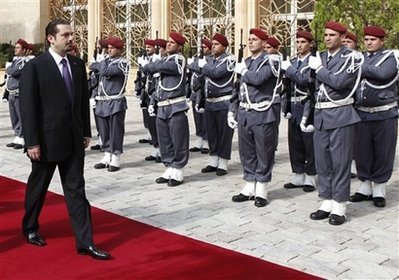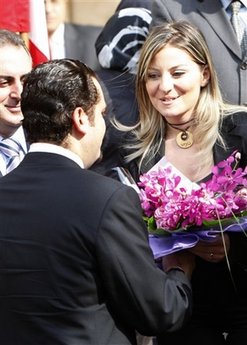-

-
Lebanese Prime Minister Saad Hariri, left, reviews an honor guard during a ceremony held on his first day at the Government House in downtown Beirut, Lebanon, Wednesday, Nov. 11, 2009. The formation of the 30-member Cabinet, (AP Photo/Hussein Malla)
-

-
An employee hands a bouquet to Lebanese Prime Minister Saad Hariri at a ceremony held on his first day at the Government House in downtown Beirut, Lebanon, Wednesday, Nov. 11, 2009, two days after the formation of the new Cabinet. . (AP Photo/Hussein Malla)
-
Please click READ MORE for more pictures of the Lebanese government
After months of negotiations, Lebanon has a new unity government comprising several factions but, as Natalya Antelava reports, many people there now view any government as largely irrelevant.
The noise was becoming unbearable. From all sides, dozens of drivers blared their horns, waved their fists and shouted at the person in front of them.
"It's all his fault," my taxi driver spat out, pointing straight ahead. I ducked out to look.
There, in the middle of the sea of honking cars, stood a thin young man in an oversized policeman's uniform.
Helplessly he waved his skinny arms trying to steer angry drivers. The problem was that he was steering them in all directions at the same time.
"He is the one who created the jam, he should just mind his own business," my taxi driver said. The fact that traffic was the policeman's business did not seem to cross his mind.
Ask anyone in Beirut and they will tell you that, if there is a really bad traffic jam, chances are there is a policeman behind it. It is not always true, of course, but it is certainly indicative of how Lebanese people approach authority.
"The best thing that the government can do is stay out of my life," a friend recently told me.
Political paralysis
The attitude is not surprising. For decades, Lebanon's politicians have done nothing but drive the country into deadlock.

The new government's first meeting was on 10 November 2009
|
The country's current crisis is just the latest episode of its chronic political paralysis.
Lebanon finally forms government

Mr Hariri's bloc won the election but had to form a unity government Lebanese President Michel Suleiman has announced the formation of the 30-member national-unity cabinet - five months after a general election. Five ministers were chosen by President Suleiman, and 15 are from PM-designate Saad Hariri's Western-backed coalition.
The remaining 10 are from the opposition, including two members of Hezbollah, which struck a deal with the governing coalition last week. The deadlock over the new government had threatened Lebanon's stability. Mr Hariri's coalition won a narrow majority in June's election, but needed to negotiate with the opposition to form a unity government. "Finally, a government of national unity is born," Mr Hariri said. "I want to be honest from the start: this government can be a chance to renew faith in the state and its institutions... or it can turn into a replay of our failures." 'Real partnership'Hezbollah representative Mohammed Fneish told the Associated Press news agency: "This formula achieves the principle of real partnership in political decision-making on key decisions."
One of the major reasons behind the delay was a series of extensive deliberations by Hariri with Free Patriotic Movement (FPM) leader Michel Aoun, who insisted that his Reform and Change bloc be granted a basket of key portfolios.
Khazen History


Historical Feature:
Churches and Monasteries of the Khazen family

St. Anthony of Padua Church in Ballouneh
Mar Abda Church in Bakaatit Kanaan
Saint Michael Church in Bkaatouta
Saint Therese Church in Qolayaat
Saint Simeon Stylites (مار سمعان العامودي) Church In Ajaltoun
Virgin Mary Church (سيدة المعونات) in Sheilé
Assumption of Mary Church in Ballouneh
1 - The sword of the Maronite Prince
2 - LES KHAZEN CONSULS DE FRANCE
3 - LES MARONITES & LES KHAZEN
4 - LES MAAN & LES KHAZEN
5 - ORIGINE DE LA FAMILLE
Population Movements to Keserwan - The Khazens and The Maans
ما جاء عن الثورة في المقاطعة الكسروانية
ثورة أهالي كسروان على المشايخ الخوازنة وأسبابها
Origins of the "Prince of Maronite" Title
Growing diversity: the Khazin sheiks and the clergy in the first decades of the 18th century
Historical Members:
Barbar Beik El Khazen [English]
Patriach Toubia Kaiss El Khazen(Biography & Life Part1 Part2) (Arabic)
Patriach Youssef Dargham El Khazen (Cont'd)
Cheikh Bishara Jafal El Khazen
Patriarch Youssef Raji El Khazen
The Martyrs Cheikh Philippe & Cheikh Farid El Khazen
Cheikh Nawfal El Khazen (Consul De France)
Cheikh Hossun El Khazen (Consul De France)
Cheikh Abou-Nawfal El Khazen (Consul De France)
Cheikh Francis Abee Nader & his son Yousef
Cheikh Abou-Kanso El Khazen (Consul De France)
Cheikh Abou Nader El Khazen
Cheikh Chafic El Khazen
Cheikh Keserwan El Khazen
Cheikh Serhal El Khazen [English]
Cheikh Rafiq El Khazen [English]
Cheikh Hanna El Khazen
Cheikha Arzi El Khazen
Marie El Khazen